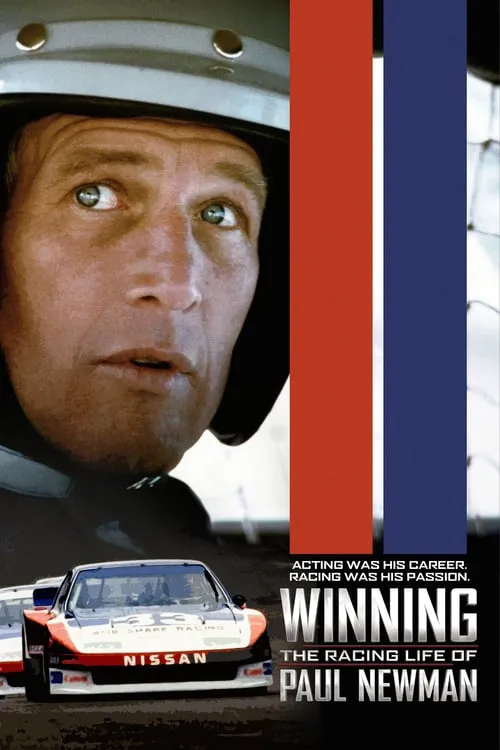Winning: The Racing Life of Paul Newman

Plot
Paul Newman's life was a symphony of contrasts – a talented actor, a devoted philanthropist, and an unapologetic speed demon. Behind the charming smile and the Oscar-worthy performances, Newman burned with an inner fire that fueled his need for speed. His passion for racing was a defining aspect of his persona, one that would eventually become as integral to his life as his film roles. Newman's love affair with racing began much later in life than he might have liked. At forty-seven, he stepped behind the wheel for the first time, marking the beginning of a journey that would span thirty-five years and claim four national championships as a driver. The catalyst for this newfound passion was the 1979 film "Winning," in which Newman starred as Frank Capua, an aging driver struggling to stay relevant on the racing circuit. While the film itself wasn't a huge commercial hit, it reignited an old flame within Newman – a flame that had once been dampened by a lack of time and resources. Growing up, Newman had always been fascinated by the speed and agility of racing. As a young man, he would watch in awe as drivers like Juan Manuel Fangio and Phil Hill tore up the tracks of Europe, their cars weaving through the curves with a poise and precision that seemed humanly impossible. Despite his own aspirations to become a racing driver, Newman's early life did not provide the financial security or the freedom to pursue such a passion. It wasn't until the 1970s, after decades of establishing himself as one of Hollywood's leading actors, that Newman found himself with the means and the time to indulge his love of racing. The success of films like "Butch Cassidy and the Sundance Kid" and "The Sting" brought him a level of fame and wealth that allowed him to pursue his racing dreams without worrying about the financial implications. However, his entry into the world of professional racing was not without its challenges. Newman was forty-seven years old, a relatively advanced age for a driver making his debut in a highly competitive field. Many experts believed that he was too old to be a serious contender, that he lacked the physicality and the instinctive feel for the track that is required to be a top-level driver. Newman himself harbored similar doubts, frequently voicing his own uncertainty about his future in racing. Despite these reservations, Newman persevered. He threw himself into the sport with a ferocity that would become a hallmark of his racing career. He devoured books and instructional guides, studied the techniques of top drivers, and spent countless hours in the simulator, honing his skills and perfecting his lines. One of his first major successes on the track came in the 1984 IMSA Lites series, where he drove to victory in the number 2 car for the Newman/Haas racing team. It was a breakthrough performance that marked the beginning of a remarkable run of success. Over the next few years, Newman notched up more wins and more championships, establishing himself as one of the most formidable forces in the world of endurance racing. But Newman's racing career was not without its controversies. He faced intense scrutiny from the racing community, some of whom doubted his commitment to the sport, suggesting that he saw racing as little more than a way to satisfy a passing fancy. Others attacked him for his perceived lack of humility, accusing him of buying his way to the top through his celebrity connections. Despite these criticisms, Newman refused to let external opinions define him. He poured his heart and soul into every racing endeavor, pushing himself to the very limits of human endurance in pursuit of victory. His willingness to take risks and face danger head-on earned him the respect of his peers, many of whom came to regard him as a true champion of the sport. Newman's greatest accomplishment as a racing driver came in the 1984 season, when he claimed his fourth national championship and cemented his status as one of the greatest drivers of his generation. It was a crowning moment in a racing career that had spanned decades, and one that marked the culmination of all his hard work and dedication. But even as he basked in the glory of his racing triumphs, Newman never forgot his dual roles as an actor and a philanthropist. He continued to make films long after his racing career had begun to wind down, always using his platforms to promote social justice and to raise awareness for the causes that mattered most to him. Newman's Own, the food company he co-founded with a small group of friends, had become a global phenomenon, donating hundreds of millions of dollars to charities around the world. In the end, Paul Newman's life story was one of contradictions – a man of great passion and great discipline, of calculated risk-taking and of generous philanthropy. His love affair with racing had been a defining aspect of his life, but it was only one thread in a rich tapestry of experiences, memories, and achievements that would be remembered long after he was gone.
Reviews
Recommendations



